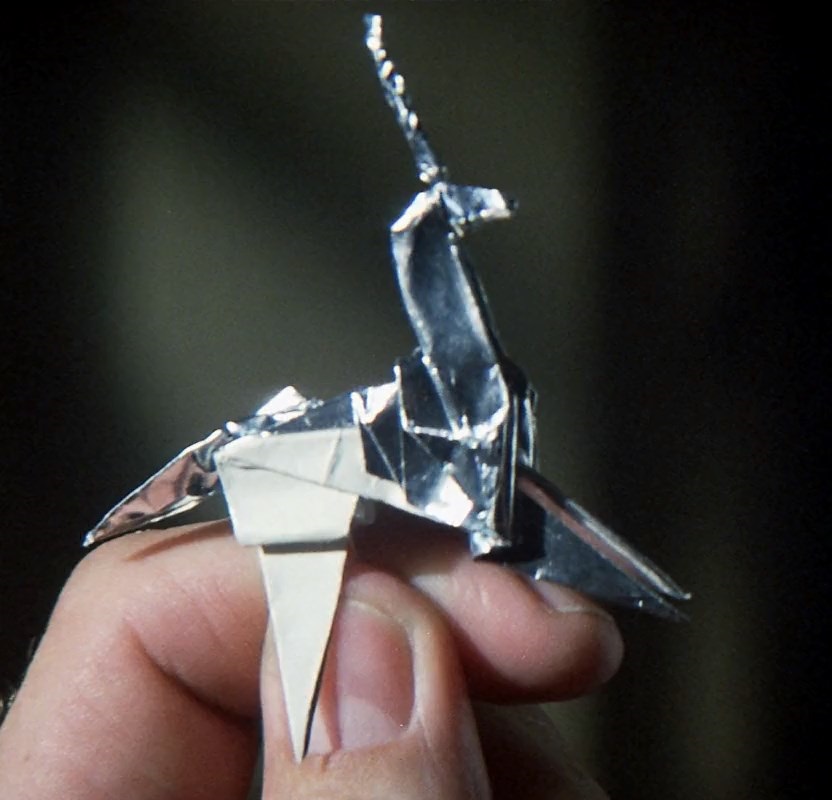Long ago, Blade Runner was my favourite film. Maybe it was an illogical choice as I had probably enjoyed many other films much more even then. It was certainly cool. I liked cool things like liked dinosaurs, space, the future and sci-fi. This one wasn’t just laser battles either and perhaps I mistook the absence of action (and many other things…) for the presence of substance and depth to its existential pretensions. It was easy to like Blade Runner because it was cool and regarded as being philosophically worthwhile. Sometimes it’s worth confronting and even castigating yourself so you can change your mind!
As many will know, Blade Runner is based very loosely on Philip K. Dick’s novel Do Androids Dream of Electric Sheep? While the book was set in 1992, Blade Runner is set in 2019. Unlike Do Androids…?, Blade Runner’s Rick Deckard isn’t married – he’s a lonely divorced man. Perhaps this and several other differences are there to up the film’s “cool” noirishness? Neither tale shares that much beyond character names.
So what of Blade Runner? Well, it’s all style over everything else, really. Its vision of 2019 Los Angeles is still worth seeing. Even though the visuals have been hugely influential, perhaps more polished facsimiles that have followed have eschewed the strangeness of it all, and have been diminished for it. One of Blade Runner’s problems is that there are so many versions. The four main ones are…
The cinema release (1982) features a studio-added ending that doesn’t make sense if you paid attention during the film and has added a cheesy, noirish voiceover to help the plebs understand what’s supposed to be happening. I don’t really mind this and perhaps I even like it to some degree.
The Director’s Cut (1992) added a dream sequence that retrofitted a fan-fuelled theory (that Deckard himself wasn’t human). Deckard was certainly human in the book and the theory was a stupid one because in a story about what it means to be human it makes sense for there to be a human being to compare the androids to. Otherwise, it’s just a load of robots running around doing stuff and there’s no existential clout in there at all. In the Final Cut (2007) Ridley Scott kept this. Perhaps the idea existed from the very beginning, but it seems that this “wouldn’t it be mind-blowing if…” idea gained legs in the years since the film was released. I really don’t think Deckard being an android himself means Scott is a genius – quite the opposite, in fact.
The Workprint version (1982) is the best one in my view and it happens to be the original version from before the makers started to second-guess themselves. It was screened to test audiences but wasn’t well received. The voice-overs and other ending were then added before it was released.
The plot? A number of replicants (artificial biological-android hybrids that resemble humans) have gone rogue and returned to earth, where they are illegal. It’s feared that they may try to infiltrate the Tyrell corporation that made them, Whatever their motives, they are expressly forbidden on earth so former Blade Runner Rick Deckard (Harrison Ford) is tasked with exterminating them.
The problem I have with Blade Runner is that it really is all style. There’s a test used in the film to trigger emotional responses in order to identify who isn’t human. The film itself doesn’t draw any response from me, except where stylised gratuitousness and other mild horror trappings are crudely used to do so. Beyond the visceral, there is that one late scene that actually is a little touching, but overdone. I find the (differing) voice-overs from the two 1982 versions of the film particularly effective here. I don’t think one is clearly better than the other but perhaps the Workprint monologue shades it for me. Other than this, Blade Runner really is a cold fish lacking in emotional depth, just like Deckard’s ex-wife considered him to be. Blade Runner would fail its own humanity test. Other than those battling for survival, the characters largely just do stuff without a convincing motivation. The love story makes no sense. It’s as though man like woman and woman like man ‘cos it says so in the script. Also, a love that begins with physical coercion simply isn’t what I’d consider love (call me whatever-fashioned that is).
Perhaps it sounds odd, but I still like Blade Runner and think it’s worth seeing. Maybe the best of it is the world your imagination conjures up after seeing the film… something that isn’t really there.
